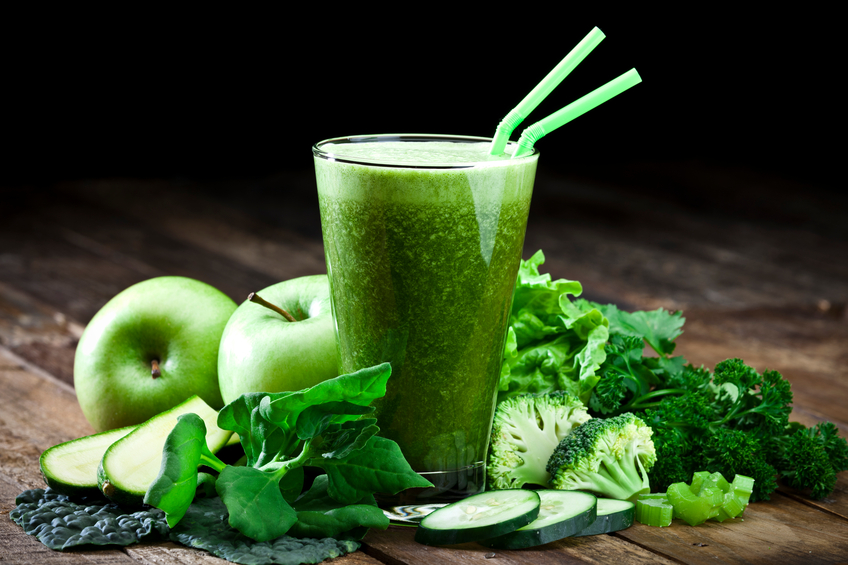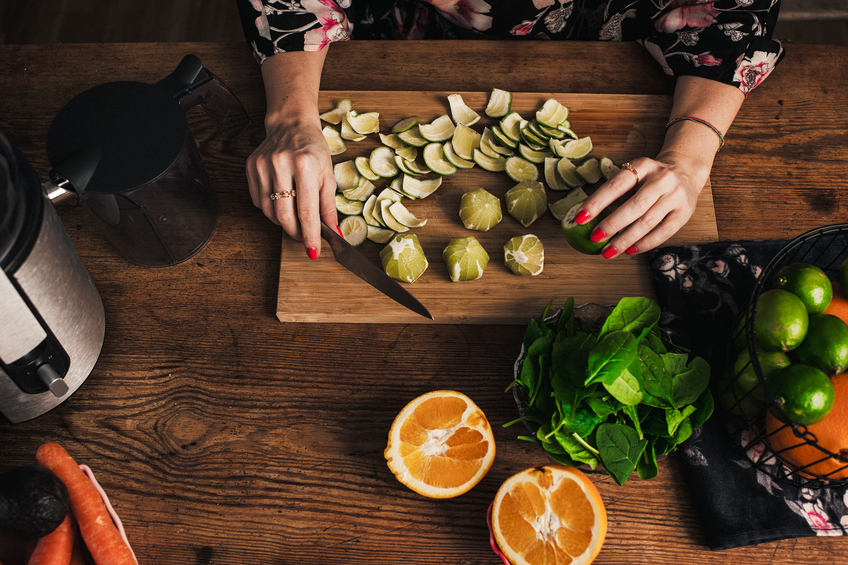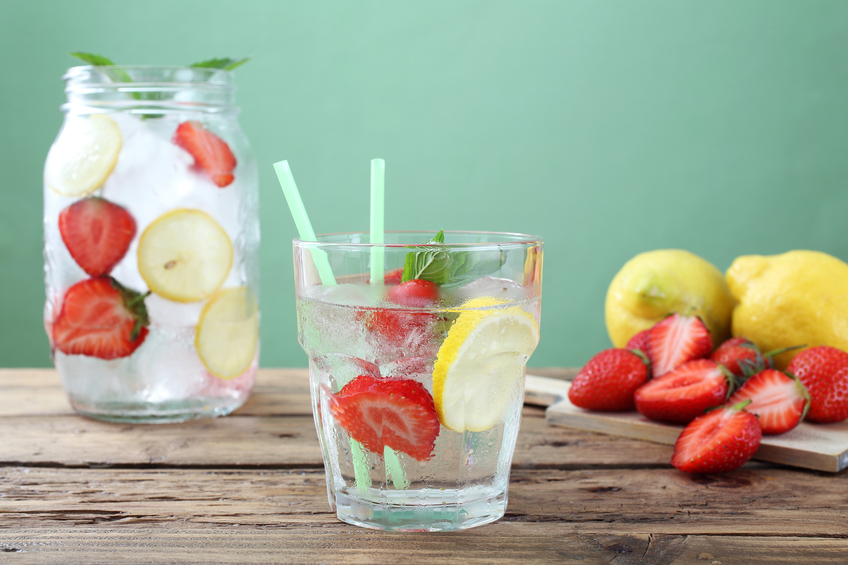Becky Graham demonstrates that you don’t have to go completely ‘cold turkey’ to benefit your health – your body can naturally do much of the hard work for you…

You might have spent the last couple of months holed up at home with your juicer or at the gym at every given opportunity; you may even have attempted a hardcore juice cleanse in a move to ‘detox’ after Christmas or take on a Lent fast. If you have managed to do all or any of these things then well done, you certainly won’t have done yourself any harm! Equally though, if you’ve fallen off the wagon once or twice, then don’t beat yourself up.
The human body is an amazing piece of machinery and is actually working to help us detoxify 24/7 through a series of metabolic processes involving five key organs – our skin, lungs, kidneys, gut and liver. Our skin is responsible for removing fat-soluble toxins and heavy metals (found in trace amounts in the environment), the kidneys are responsible for water-soluble substances, and our lungs excrete toxins simply through the process of breathing. However, it is our liver that is the main player, responsible for getting rid of virtually all chemicals from the body. It is central not only for every day detoxification, but also for blood sugar control, immunity, hormonal balance, digestion and dealing with bacteria and toxins from the intestines.
The liver is like a busy factory; processing, packaging, distributing, storing and utilising all of the nutrients we get from our food. It works in two phases and uses over 12% of our total energy supply to filter about 1.5 litres of blood every minute of the day. Overeating or eating too many rich or processed foods, or consuming additional toxins like alcohol, sweets and chocolate, or being exposed to cigarette smoke, all place an extra burden on our bodies and it’s easy to see how the liver can become overwhelmed. This can leave us feeling tired, sluggish and potentially prone to picking up bugs and infections.
Symptoms like these may indicate an overworked liver: fatigue, headaches, depression, poor memory, achy joints, nausea, constipation, diarrhoea, bloating, greasy fatty stools or particularly dark urine, yellowish skin, psoriasis, bad breath, acne or skin rashes. You may even feel tender in the region where the liver is located (on your right hand side above your tummy). As the liver becomes overwhelmed, the first place you are likely to see symptoms is your skin in conditions such as acne or rosacea.
So is a detox worth it? If you’re experiencing any of the symptoms described, then it can’t hurt to give your diet and lifestyle a quick tune up, but it’s more important to make sure that the liver is working as best it can all year round. In order to ensure the liver is able to do its job properly, it’s essential to look at gut health too. The liver and gut are the cornerstones of good health. For example, if we’re constipated then toxins that should be excreted can re-enter our blood stream and have to be re-processed and packaged by our livers, all adding to the overall burden.

Focus on the following to keep your liver and gut in tip-top health:
Your diet should be centred on a wide selection of whole, unprocessed foods, ideally organic, including fruit, veg, whole grains, nuts, seeds and oily fish.
- Fibre rich foods such as vegetables and whole grains add bulk to the stool and help food pass more quickly through the stomach and intestines. Include beans, peas, lentils, green leafy veg, apples, nuts and seeds. Helpful gluten-free grains are oats, buckwheat, quinoa, amaranth and millet.
- Probiotic are live microbial organisms that are naturally present in the digestive tract. Beneficial bacteria help digest foods, utilise vitamins and minerals and encourage a healthy immune system.
- Fermented foods such as kombucha tea, yoghurt, kefir, miso, kimchi
and tempeh help to promote gut health. - Magnesium is ‘nature’s relaxant’ and is particularly important if you’re suffering with constipation; dark green leafy veg, pumpkin seeds, beans and lentils and oily fish are all good sources.
- Sulphur-rich foods such as garlic, onions, leeks and eggs help the body synthesise glutathione – one of the body’s primary naturally produced antioxidants – and are particularly helpful for the liver.
- Cruciferous vegetables such as cabbage, kale, broccoli, cauliflower, Brussels sprouts and collard greens are also sulphur containing and a source of chorophyll and indole-3 carbinole, which have an antioxidant effect.
- Brightly coloured berries are rich in antioxidants that help to neutralise ‘free radicals’ produced by the detoxification process.
- Beetroot can be used to stimulate liver function, as well as an array of other health benefits.
- Curry Load up on turmeric. The active compound curcumin is a potent anti-inflammatory that may also be helpful in protecting the liver.
- A slice of fresh lemon in hot water is a great start to the day. Lemon juice helps to stimulate digestion and it also has antibacterial and detoxifying properties.

A simple 3-day programme:
You’re the best judge as to whether you think you might benefit from a detox regime, but you definitely don’t need to go to extremes:
Day 1
You don’t want the body detoxifying too quickly, so to begin with follow a whole food diet.
Eat fruit, vegetables, nuts, seeds and their cold-pressed oils, legumes, sprouts and whole grains.
Avoid caffeine, alcohol, tobacco, drugs, meat, fish, dairy, gluten grains, refined foods, fried foods, sugar and salt.
Drink only bottled or filtered water, fruit and veg juices & caffeine free herbal teas.
Day 2
Stick to raw fruit and veg only.
Fresh fruit and/or real fruit juices in the morning, a vegetable salad for lunch (raw or lightly steamed), either fresh fruit or a vegetable salad in the evening. Fruit and juices can be consumed throughout the day.
Day 3
Is the same as day 1. Get yourself back on the whole foods.
For ongoing health, as long as you’re sticking to real, unprocessed foods you’re onto a winner. If in doubt, try and keep this phrase in mind: ‘just eat real food’ or remember it’s comedy moniker – JERF!
For more information, visit www.healthyhedonist.co.uk
 About the author: Becky Graham is a registered nutritional therapist based at the renowned Institute for Optimum Nutrition in Richmond, London. She is trained in functional medicine, which uses a completely personalised approach to nutrition, working with a wide range of conditions from stress and low energy to digestive or hormonal imbalances. As well as working with clients on an individual basis, Becky works with large companies to support health and wellbeing initiatives. Combining nutrition with work in television, she is passionate about supporting busy lifestyles with food.
About the author: Becky Graham is a registered nutritional therapist based at the renowned Institute for Optimum Nutrition in Richmond, London. She is trained in functional medicine, which uses a completely personalised approach to nutrition, working with a wide range of conditions from stress and low energy to digestive or hormonal imbalances. As well as working with clients on an individual basis, Becky works with large companies to support health and wellbeing initiatives. Combining nutrition with work in television, she is passionate about supporting busy lifestyles with food.
